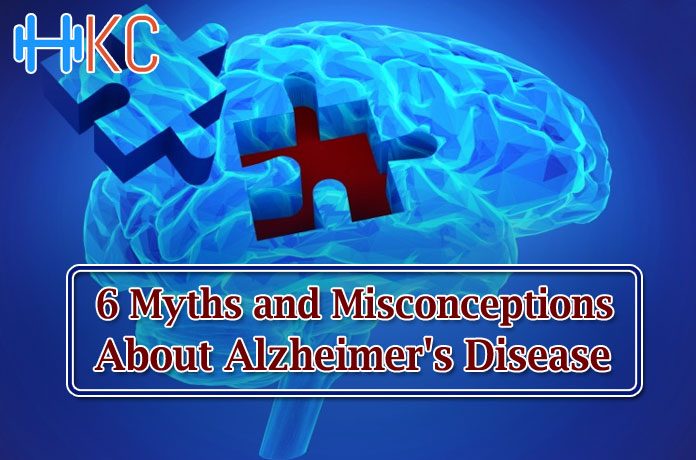6 Myths and Misconceptions About Alzheimer’s Disease
Alzheimer’s disease is a progressive neurological disease that often leads patients back to infancy. It causes severe memory loss and, for some patients, it prevents them from remembering their own family members. As the disease progresses, patients will require around-the-clock care through at-home nursing services or through admission to a nursing home facility. Families who want to learn more about the disease can read the six myths and misconceptions about Alzheimer’s disease.
#1. Only Patients Who are 65 Get It
Among the most common myths about Alzheimer’s disease is that only patients who are around 65 or older are likely to get the disease. This isn’t true, and there have been patients throughout medical studies who were as young as 40 that developed the progressive disease. According to scientific facts, Alzheimer’s disease isn’t exactly an age-related disease. It develops due to brain damage that could occur at any age and causes the sudden and unexpected progression of the disease. Some patients aren’t aware of the disease until their memory issues become more pronounced.
Severe brain injuries in automobile accidents, during surgeries, or traumas can lead to the development of Alzheimer’s disease. It is triggered by brain damage that affects the patient’s memory and cognitive function. Patients with traumatic brain injuries are at a higher risk of developing Alzheimer’s disease and progress through the disease at an alarming rate. The effects could generate lasting and permanent memory loss. For others, the disease progresses so quickly that the family is dumbfounded. If you need more information, you can get details from Parc Provence now.
#2. Women are Less Likely to Get It
The common joke is that a mother cannot get Alzheimer’s because mothers remember everything. This is just not at all factual. According to studies, two-thirds of Alzheimer’s patients are women. Recorded facts show that women are more likely to develop the disease than men. It is likely that men could develop Alzheimer’s disease in later life, but female patients are the most common patients who develop early-onset Alzheimer’s.
Any woman that sustains a serious brain injury could develop Alzheimer’s. Since it is more prevalent in women than men, a neurologist will monitor patients with brain injuries more frequently if the patient is a woman. This is because there is a higher risk for brain disease development, and the type of brain injury could prevent the patient from healing completely. Some patients don’t experience any Alzheimer’s symptoms for many decades following the treatment for their initial brain trauma or injury.
#3. It is Hereditary
It doesn’t matter if your grandparents on both sides of your family had Alzheimer’s disease. Studies show that it is not hereditary and it is not linked to genes passed on to children. Genetics do play a role in diagnosing the disease, but there isn’t a link between family members and the development of Alzheimer’s.
Doctors can conduct gene evaluations and determine if the patient has the genes that are known for causing Alzheimer’s. With the right information, the patient can evaluate the most common causes of Alzheimer’s and determine how to slow down the progression and development of the disease. Research is being conducted every day to find a cure for Alzheimers’s and restore the memory after patients are diagnosed.
#4. The Diagnosis is a Death Sentence
A diagnosis of Alzheimer’s disease isn’t a death sentence. Yes, as the disease reaches the last stage, the patient enters a more infant-like state and could forget how to swallow or breathe. However, there isn’t a guarantee that the disease will progress slowly or rapidly. It is a matter of chance, and proper monitoring by a healthcare professional is always required. Neurologists conduct regular assessments for their Alzheimer’s patients and determine if there are any signs of further progression.
It is possible for a patient to live with the disease for as long as twenty years before exhibiting any long-term or devastating symptoms. Alzheimer’s is hallmarked by a sudden decrease in memory function. A number of treatment options are available to improve the memory and prevent patients from falling into a more debilitative state. Prescription medications and vitamin therapy are often used to improve cognitive function for Alzheimer’s patients.
#5. It Makes All Patients Angry
Alzheimer’s disease and dementia are often confused with more devastating and personality altering mental conditions. Not all patients who are diagnosed with either condition become violent or injure caregivers. Typically, the patients who become violent had a pre-existing mental condition that led to violence or a predisposition in their personality to behave in a violent manner.
There are horror stories told by nursing home staff that involve patients who become dangerous and attacked them. This isn’t always the case with Alzheimer’s patients. The symptoms include disorientation, which can make patients confused and fearful. When this happens, it is likely that a caregiver will need to sedate the patient to prevent them from injuring a caregiver. However, the actions aren’t based on a history of violence, but they are based on a natural instinct to protect oneself. At later stages of the disease, the patient won’t know who they are, and they can become confused about the identity of caregivers.
#6. All Seniors Will Get It
Alzheimer’s disease does affect more seniors than other age groups, but many seniors never develop the disease. It is not classified as an old person’s disease, and just become some seniors can become forgetful it doesn’t mean they have Alzheimer’s disease. A proper diagnosis and brain scan determine if the patient has Alzheimer’s disease. Seniors who have exhibited signs of the condition should discuss their symptoms with their healthcare providers.
A diagnosis of Alzheimer’s disease doesn’t mean the patient’s life is over. In fact, some patients don’t exhibit symptoms for up to 20 years. It isn’t an age-based disease, although a larger population of patients are seniors. Alzheimer’s disease is not hereditary and is caused by the presence of a specific gene or brain injury. Families that want more details about the disease can obtain additional information from a healthcare professional.
















